Advertisement
Solving Our Math Problem
Why Thousands Of American Parents Are Sending Their Kids To 'Russian Math'
Resume
When Larisa Itina was emigrating from Russia in 2000, her son Boris told her not to bother packing all the toys, games and puzzles she'd collected for helping children learn math.
He said, " 'Mother, you will never use this in the United States,' " she recalls. "All of the people I know said to me, 'You will never teach in the United States. It's not possible.' "
They were very wrong. These days, Itina helps run a thriving after-school program in Brighton called the Studio of Engaging Math. Turns out, a great many American parents want to send their kids to what most of us call simply "Russian math." (As in my nagging refrain when my own children were younger and went to Itina's studio: "Have you done your Russian math homework yet?")
From Newton to Brooklyn, from Dallas to San Jose, "Russian math" is a rising trend, driven by a fast-growing chain called the Russian School of Mathematics. With 22,000 students at latest count, the school is the giant among Russian math programs, boasting 15 branches in Massachusetts, where it began, and 40 in total across the country.
One of those 22,000 students is 10-year-old Liv Davidson from Wellesley, who has been coming to the Russian School of Mathematics since kindergarten. She says she finds it fun — and helpful with her regular-school math: "Well, it's more challenging than school math — way more challenging," she says. "It's like, the next level of math, so I've already learned the stuff I learn in school, which makes it easier."
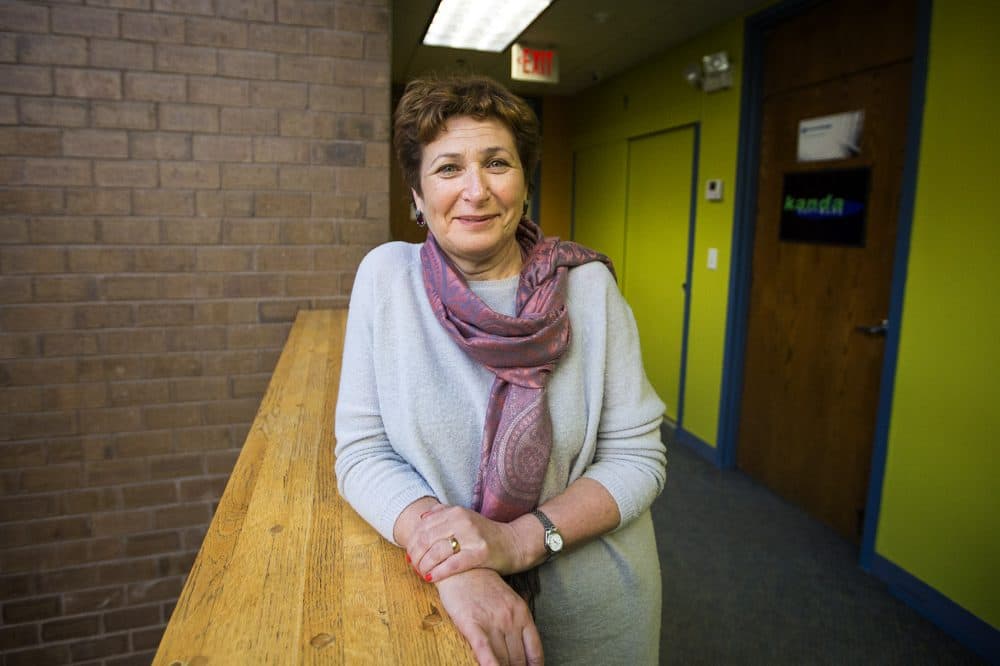
Inessa Rifkin, who co-founded the school 20 years ago in Newton, says that one-fifth of the town's elementary school students come to the Russian School of Mathematics these days. "We are taking what the Soviets did the best — math education — and we bring it out of that awful closed society to the free world," she says.
Where, it turns out, demand is rising along with the increasing emphasis on math education.
"I've read articles that, in the future that the kids will live in, math will be one of the most important skills, in addition to computer science," says Lisa Watanabe, whose daughter attends the Russian School of Mathematics branch in Brookline. "I just feel that if she's strong in math, it will open so many doors."
Students usually attend once a week, at a cost of about $2,000 a year. In towns where it's popular, Russian math has a somewhat daunting reputation for rigor — and thick packets of homework.
Rifkin says the school's curriculum is based on Russian teaching traditions that emphasize reasoning and deeper understanding early on, not just memorization and practice drills. "The child should be brought to abstract level as soon as possible," she says, "meaning early introduction of algebra and geometry, not only arithmetic," and helping children figure out principles for themselves rather than spoon-feeding them.
After-school math — what’s called math "enrichment" — is not new, from global chains like Kumon, which originated in Japan, to private tutoring and the online Khan Academy. But Russian math as a big "thing" among American schoolchildren is relatively new — and it's spreading so quickly that some parents say they worry their children will be at a disadvantage if they don’t go to Russian math.
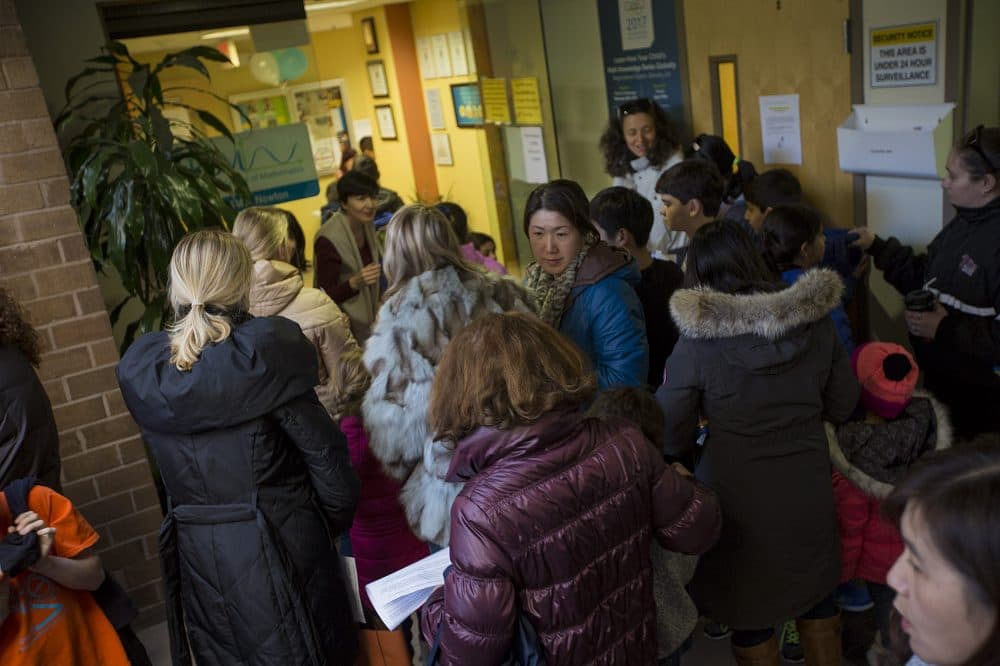
Some parents send their children to Russian math because they're dissatisfied with their school curriculum, or because their child simply loves math and wants more, says professor Jon Star, who researches math education at the Harvard Graduate School of Education.
For some, there's also an element of keeping-up-with-the-Joneses.
"They may feel that their child will be behind in school if they don't get the after-school help," Star says, "and it sort of leads to this kind of arms race, if you will, of after-school math instruction."
The Real Arms Race
The story of Russian math in America begins with a real arms race: the nuclear face-off between the Soviet Union and the United States during the Cold War. To bolster its science, the Soviet Union created elite math-and-physics schools and funneled the smartest math-minded kids into them.
"Russia has a brilliant mathematical tradition," says professor emeritus Loren Graham of Harvard and MIT, a leading American historian of Russian science. "There was a time in the Soviet period when Moscow was, in my opinion, the strongest center of mathematics in the world. Then it was hurt a lot by emigration — but it’s still strong."
That emigration, mainly of Russian Jews, began as a trickle in the 1970s. But as the Iron Curtain lifted, it turned into a great exodus, including an estimated half a million people who came to the U.S., many to the Boston area.
"I always tell my children, 'If you think about our immigration, we didn’t have anything, you know that, only education,' " says Rifkin, of the Russian School of Math.
She emigrated with her family in 1988 from Minsk, where she worked as a mechanical engineer, to Boston. She and her husband adapted quickly — they found work and bought a home in Newton. Life in America was working out well, until her son Ilya was in eighth grade and she got a life-changing shock: She realized he didn't know any of the math she expected him to know at that age.
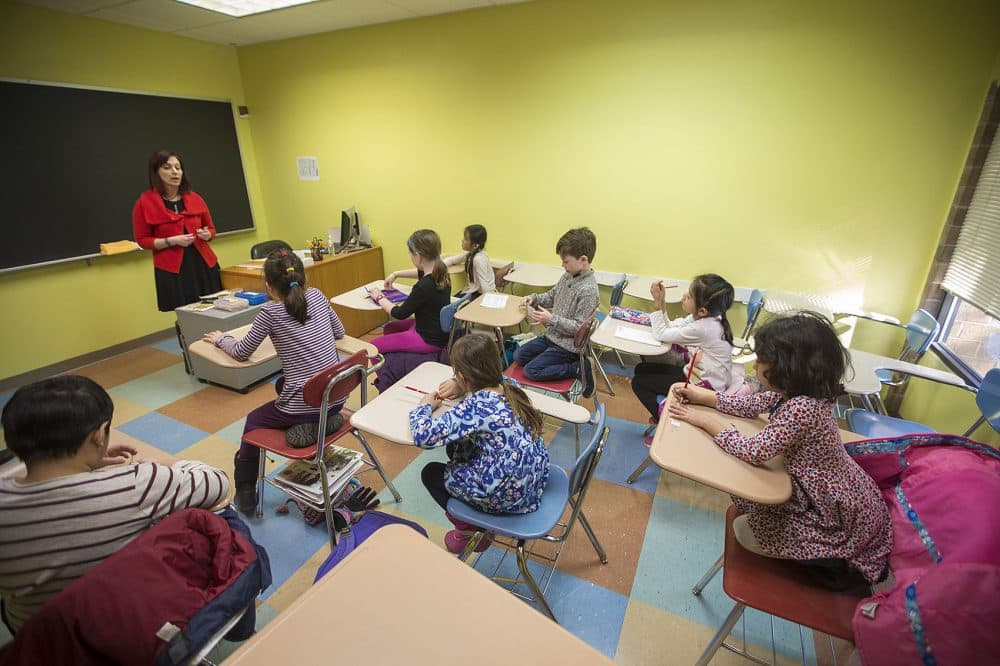
"So I started to talk to other Russian families, and they had all the same problem," she recalls. "And the main problem wasn't even attitude; the main problem was performance in math and science. And all of us engineers, and all of us making money with math and science, this is what let us become independent so quickly. And our kids, they don't know it, so what are they going to do?"
When the Russian School of Mathematics opened at her home in 1997, she expected mainly Russian immigrant families to enroll, and many do. But with the rising importance of technology and science in the economy, plenty of other families see the virtues of Russian math, too.
A few voices from parents who send their children to the Brookline branch:
Joanna Messing: "We looked at the American mathematics program and American scores, and it was underwhelming to say the least."
Dominic Nicholas: "[Our son] had some natural proclivity for math, and we wanted to have him reach his maximal potential. And it didn't feel like that was necessarily going to happen in public school."
Rafael Irizarry: "Our biggest fear was that she would think math was boring and not interesting and not like it, and Russian math has saved us from that."
Deep Understanding Of 'Why'
Slava Gerovitch, a math historian at MIT, says that despite the American parental shorthand, there’s actually no single thing called "Russian math."
"It’s not that the Russians particularly have a gene for math or anything like that," he says. "But I think there are some systemic features of the Soviet school system that helped kids learn math easier and better."
Among them: strong training for teachers, and well-honed textbooks used by virtually the entire country. They were "not just sets of problems but also deep explanations," Gerovitch says, helpful references if students couldn't understand classroom work.
"The way Russians teach is that they make sure that every student, when they perform a mathematical operation, they understand why it is performed this way, not just learn how to do it," Gerovitch says.
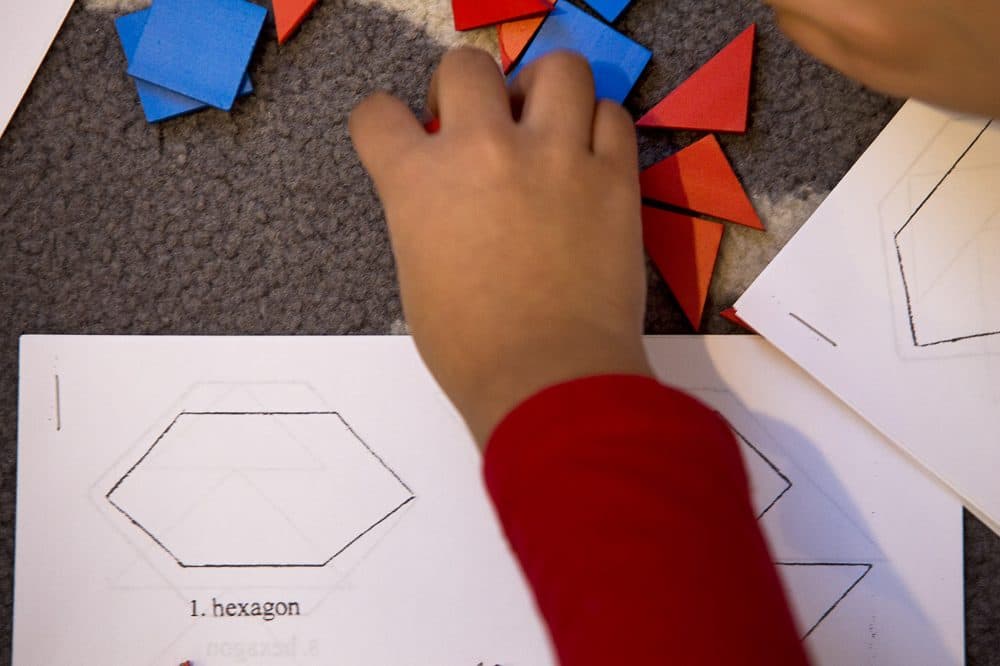
Itina, at the Studio of Engaging Math, helped write some of those Russian textbooks, and now enlivens and adapts that material for children in Brighton. She says math inevitably involves some work — just as playing an instrument requires practice — but the key to teaching math to kids is to understand that they can work well only if they're emotionally invested.
"If I give to a child some problem in the academic style, he will say, 'I don't understand that, I hate it,' and go away," she says.
So a typical math problem at the studio might involve the geometry of a princess' castle, says Itina's daughter, Anya, who teaches there. Students at the studio play extensively with "manipulatives," shapes and puzzles that help them learn using their hands — a collection vastly expanded beyond the paraphernalia Itina brought from Russia.
"What I think I do," Anya Itina says, "is to develop critical thinking, as well as certain math skills, through understanding and not memorization, while trying to make it more fun, in small groups."
Here's the irony: To Americans, she teaches "Russian math," but as the product of real Russian schools, she can see how dramatically "Russian" teaching in this country differs from back in the USSR. For example, in contrast to big Russian classes at regimented desks, the studio teaches only in small groups of a half-dozen children around a table. And it divides the groups by ability levels, so it might have five or six different leveled groups for children who are all in the same grade at school.
"This is not a Russian thought," Anya Itina says. "Russian thought is everyone learning the same way."
At a recent Studio of Engaging Math class for kindergartners, the students solve some basic addition and subtraction problems on paper, but also a harder puzzle that teacher Elina Starobinets presents on the chalkboard:
First line: A blank box shaped like a triangle + a blank box shaped like a circle = 12.
Second line: A triangle box + a triangle box = 16.
The kids figure out right away that the triangles have to be 8 and so the circle has to be 4, but Starobinets pushes them a little further:
"Why did you start with the triangles first?" She calls on Sonia Shroff, who's raising her hand. In a piping but confident voice, Sonia asserts her idea: "You should do the bottom one first, because they're the same."
Right, Starobinets affirms. "They're the same number, so I'm only guessing one number."
Sonia has just derived the principle that it's best to solve equations with only one unknown. At age 6.
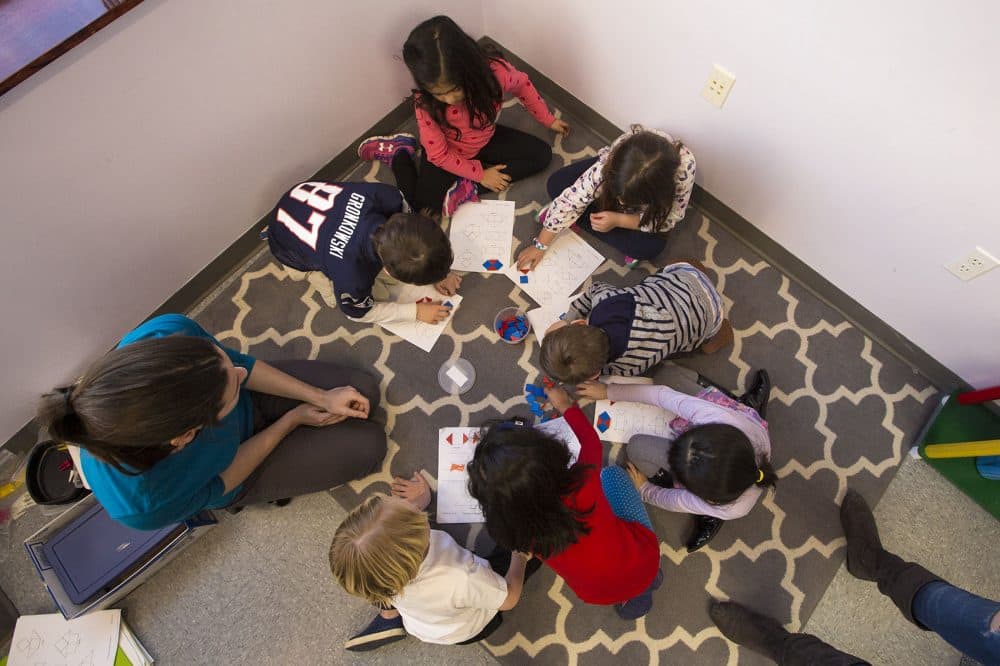
Challenges For American Schools?
The rise of Russian math classes can pose challenges for American schools. For example: when a teacher introduces a new topic, only to find that a quarter of the students have already covered it in Russian math.
Some teachers find Russian math may also make some kids overconfident about how well they understand a math topic, says Steven Rattendi, the chair of the math department at Newton South High School.
And there’s concern that Russian math could increase the math performance gaps between rich and poor, between families that can afford $2,000 a year for weekly after-school classes and those that can’t.
But Russian math also seems to be helping to expand the pool of American kids who are comfortable with math. In every town where the Russian School of Math establishes itself, says co-founder Rifkin, "very quickly the number of honors classes, especially in high school, grows tremendously."
At Newton South, the percentage of students in honors math classes has gone up from about 20 percent to 30 percent over the last decade, Rattendi says. But is that thanks to Russian math? Without data, he cannot say.
He does worry that the sheer numbers of students in Russian math may add to pressure on parents and kids.
"'My neighbor's child is in Russian math, I need to be in Russian math,' " Rattendi says he hears. "And I think the answer to that is probably no. You don't have to be in Russian math to be successful in math. Does extra math certainly help? Absolutely. I can't take that away. Just like extra music lessons outside the school day are going to make you better at playing the violin."
Russian math teaching methods have not been extensively studied by American researchers, says Harvard professor Star, probably because Russia doesn't top the list of international math scores as, say, Singapore and Finland do.
But its popularity has reached the point, he says, that if it is making public school teachers' jobs harder because it increases the gaps among students, then "we have to think about what challenges this creates for the school system and how we can solve those challenges. And that's something that we should be doing."
It remains to be seen how big Russian math will grow, and what effect it will have overall.
For now, at the individual level, Rifkin says her teachers see a difference when their students face a hard problem. They go from a knee-jerk "I don't get it," she says, to "Hmmm, let me think..."
This segment aired on April 13, 2017.
